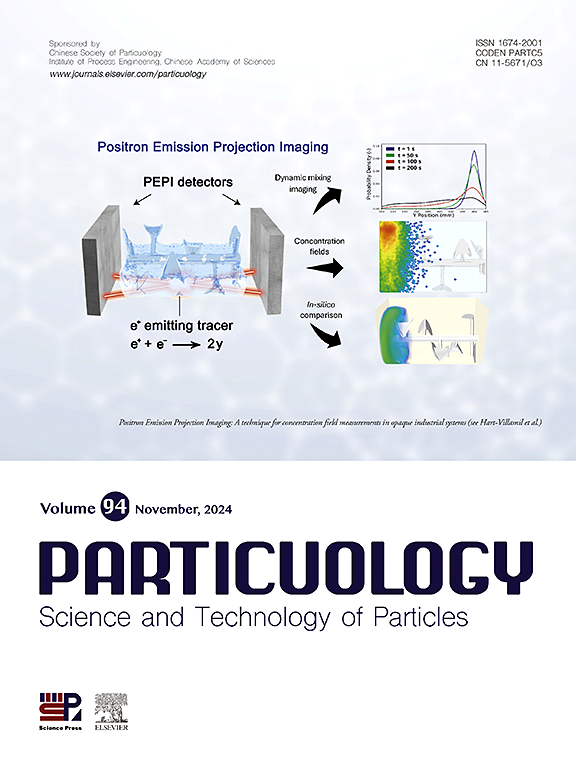Heat transfer characteristics of CaO/Ca(OH)2 particle fluidization for thermochemical energy storage
IF 4.1
2区 材料科学
Q2 ENGINEERING, CHEMICAL
引用次数: 0
Abstract
Thermochemical energy storage (TCES) based on the reversible hydration/dehydration of CaO/Ca(OH)2 is emerging as a promising method for harnessing sustainable and renewable energy sources. In this study, a fluidized bed reactor was utilized to investigate the flow and heat transfer characteristics of micron-sized CaO/Ca(OH)2 particles under dilute-phase conditions. Detailed experiments were carried out to measure particle concentration, temperature distribution, and heat transfer coefficients across a range of operating parameters. The results demonstrated that the heat transfer coefficient from the heated wall to the fluidized particles increases significantly with both reaction temperature and vapor partial pressure. Furthermore, the cluster renewal model was employed to predict the heat transfer behavior, achieving a low average relative error compared to the experimental data. These findings enhance the fundamental understanding of fluidized-bed-based CaO/Ca(OH)2 TCES processes and offer practical guidelines for optimizing large-scale, high-temperature energy storage systems in support of intermittent renewable energy applications.

CaO/Ca(OH)2颗粒流化热化学储能的传热特性
基于 CaO/Ca(OH)2可逆水合/脱水的热化学储能(TCES)正在成为利用可持续可再生能源的一种有前途的方法。本研究利用流化床反应器研究了微米级 CaO/Ca(OH)2 颗粒在稀相条件下的流动和传热特性。详细的实验测量了颗粒浓度、温度分布以及不同操作参数下的传热系数。结果表明,从加热壁到流化颗粒的传热系数随着反应温度和蒸汽分压的升高而显著增加。此外,采用簇更新模型预测传热行为,与实验数据相比,平均相对误差较小。这些发现加深了人们对基于流化床的 CaO/Ca(OH)2 TCES 过程的基本了解,并为优化大规模高温储能系统以支持间歇性可再生能源应用提供了实用指南。
本文章由计算机程序翻译,如有差异,请以英文原文为准。
求助全文
约1分钟内获得全文
求助全文
来源期刊

Particuology
工程技术-材料科学:综合
CiteScore
6.70
自引率
2.90%
发文量
1730
审稿时长
32 days
期刊介绍:
The word ‘particuology’ was coined to parallel the discipline for the science and technology of particles.
Particuology is an interdisciplinary journal that publishes frontier research articles and critical reviews on the discovery, formulation and engineering of particulate materials, processes and systems. It especially welcomes contributions utilising advanced theoretical, modelling and measurement methods to enable the discovery and creation of new particulate materials, and the manufacturing of functional particulate-based products, such as sensors.
Papers are handled by Thematic Editors who oversee contributions from specific subject fields. These fields are classified into: Particle Synthesis and Modification; Particle Characterization and Measurement; Granular Systems and Bulk Solids Technology; Fluidization and Particle-Fluid Systems; Aerosols; and Applications of Particle Technology.
Key topics concerning the creation and processing of particulates include:
-Modelling and simulation of particle formation, collective behaviour of particles and systems for particle production over a broad spectrum of length scales
-Mining of experimental data for particle synthesis and surface properties to facilitate the creation of new materials and processes
-Particle design and preparation including controlled response and sensing functionalities in formation, delivery systems and biological systems, etc.
-Experimental and computational methods for visualization and analysis of particulate system.
These topics are broadly relevant to the production of materials, pharmaceuticals and food, and to the conversion of energy resources to fuels and protection of the environment.
 求助内容:
求助内容: 应助结果提醒方式:
应助结果提醒方式:


